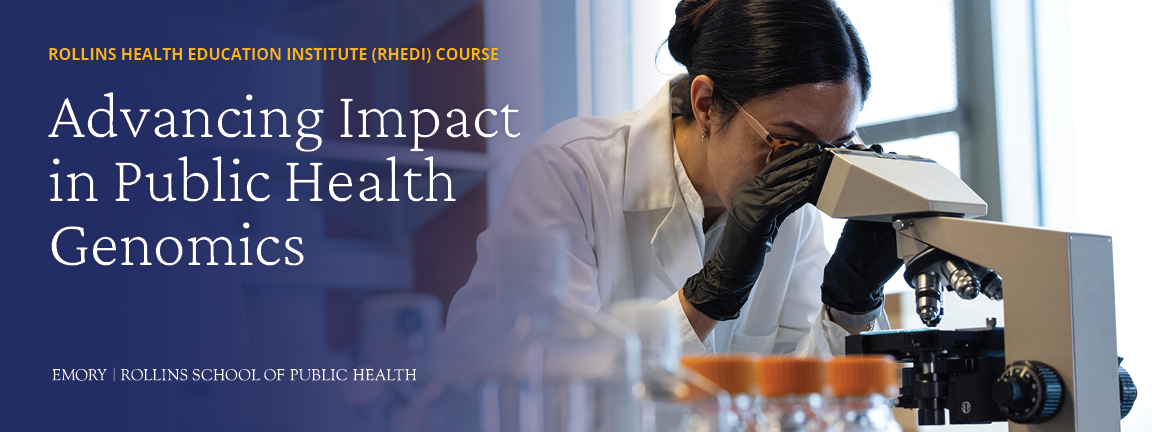Equipping researchers and practitioners with the tools to improve public health through genomic innovations.

Advancing Impact in Public Health Genomics
DATES
June 2 – July 11, 2025
FORMAT
Online
COST
$2,000
2 Course credits
How to Register
- Professionals/Continuing Education: Use the “Register Now” button below to sign up.
- Current Degree Seeking Students: If you are interested in enrolling in a course, please email rsph.ed.institute@emory.edu. Current Rollins students need instructor permission. RHEDI courses may be rescheduled based on enrollment and are not guaranteed for graduation requirements.
- Special Standing Professionals: Professionals currently with special standing status at the Rollins School of Public Health may register by contacting rsphenrollmentservices@emory.edu. If you are interested in applying for special standing status, visit our website to learn more.
Scholarships and Discounts
- Emory University employees may be eligible for Courtesy Scholarship. Please visit Employee Benefits page to learn more.
- Emory Healthcare employees may be eligible for Tuition Benefits. Please visit ECH Employee Benefits page to learn more.
- A discount is available for public health professionals who have lost their employment due to recent federal actions. Reach out to rsph.ed.institute@emory.edu for details.
- Researchers and postdoctoral fellows conducting translational genomic research
- Health professionals and public health practitioners interested in advancing equitable access to genomic innovations
Advances in genomics and technology have transformed our understanding of disease biology and improved clinical care, resulting in life-saving outcomes. However, disparities in access to and benefits from these innovations persist, underscoring the need for translational research that promotes equitable access to genomic advancements. Addressing these disparities requires a strategic research agenda to overcome psychosocial and structural barriers and a well-prepared workforce skilled in public health genomics. This interdisciplinary online course is designed for postdoctoral fellows, practitioners, and health professionals involved in translational genomic research or practice. Participants will explore how to apply genomics to improve public health, leveraging insights from epigenetics, social and behavioral sciences, and public health to advance equity and impact.
- Explain the principles of diversity, equity, inclusion, and accessibility (DEIA) in public health genomics and their importance in addressing disparities in access to genomic innovations
- Assess how DEIA impacts scientific rigor and equitable access to genomic applications in public health research and practice
- Develop strategies for community engagement that promote public understanding of genomics and support equitable implementation of genomic innovations
- Analyze public health genomics problems from social, epidemiological, environmental, behavioral, and organizational perspectives
- Describe how knowledge of the genetic basis of human diseases can be applied in public health research and interventions to improve health outcomes
- Apply advanced research methods in population science, including evidence synthesis, implementation science, and program planning and evaluation to address public health genomics issues
Faculty

Yue “Guan” Guan, PhD, ScM, CGC
Associate Professor
Behavioral, Social, & Health Education Sciences
Rollins School of Public Health, Emory University

Yan Sun, PhD
Professor of Epidemiology, Global Health, and Medicine
Rollins School of Public Health, Emory University

Lauren Lichten, MS, CGC
Licensed, Certified Genetic Counselor
Assistant Professor, Department of Human Genetics
Emory University School of Medicine
Questions? Contact us at rsph.ed.institute@emory.edu

